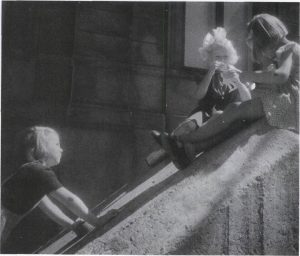At the end of the 1970s, Ebba Haslund (1917-2009) was asked why her writing had fascinated so many people; she replied: “I use my characters to say something about the day and age; I want them to be real people, not just walking mouthpieces. Delving into the depths of the human soul has never been my business.” Ebba Haslund’s comment can partly be seen as a response to those critics who had early on attacked her novels for lacking psychological depth. Her primary interest was the social situation and conditions of life for the middle-class woman in post-war Norway. She belonged to that generation of women who, during and immediately after the Second World War, had fulfilled an important role as housewives at a time when many families lived in immense hardship, almost at subsistence level. Ebba Haslund defended housewives, but at the same time she could see how increased prosperity and modern technology reduced the scope of their undertaking. She therefore not only defended the woman’s right to be a normal housewife but also her right to deviate from traditional gender patterns.

Thus, in the novel Det hendte ingenting (1948; Nothing Happened), an intellectual, well-educated, and unmarried woman, Edle, asks the question: “Why can we not be allowed to grow as we choose? Why can one not be the person one is, and become what one ought to become?” Edle, however, becomes an example of a single woman who yearns for love. Her opposite party in the novel is a woman who is married and has children, but wants education and freedom. Young and adult women in the 1940s would seem to ‘fall between two stools’, as expressed in the novel Siste halvår (1946; The Last Six Months). Edle’s yearning for love proves to be primarily directed towards another woman – which makes her ‘different’. The other woman – Gro – is presented as an ideal: studying is not a waiting period before she gets married, nor is it a potential safety valve for the spinster; she counts on both/and. During the war Gro is active in the resistance movement; she is taken prisoner and dies in a German concentration camp. Edle is left to stagnate inside her shell of bitterness over the limited opportunities for her life. The novel is written in diary form, the reader often able to see through the wall of defence built up by the diarist.
Edle does not comply with expectations of the traditional female role and therefore feels vulnerable and deviant. But the ‘normal’ women also have a large part to play in Ebba Haslund’s literary universe. As housewife in the family, the woman is only in focus when husband and children have need of her. In the short story “En av de mange” (One of the Many), from her debut collection Også vi … (1945; We, Too…), a housewife finds that her voice is listened to – while, that is, her husband is in prison. The men in their circle of acquaintances take her seriously; the moment her husband is released, however, she has to return to her wife’s servicing role: “But the guests did not have an ear for Mrs Jensen’s outpourings. It was Jensen who had their interest.”
Blame is not laid exclusively at the door of the men; the women, too, are criticised. The novels Krise i august (1954; Crisis in August) and Bare et lite sammenbrudd (1975; Just a Little Breakdown) give an account of married women in their pursuit of creating well-turned families and well-turned children. These families are intruded upon by mistresses or the fear of mistresses, a theme that also addresses the circumstance that man and woman are bored in the midst of a well-turned life – it becomes empty and without new possibilities.
Ebba Haslund is always topical in her books. Her novel Krise i august (1954; Crisis in August) addresses an increasingly visible problem in the 1950s – adultery and the rising number of divorces. Bare et lite sammenbrudd (1975; Just a Little Breakdown) tells what can happen once children have flown the nest. The stay-at-home mother has a breakdown. She has no alternative to the life she is leading because, like so many women who got married in the 1940s and 1950s, she had not pursued further education and work outside the home.
Ebba Haslund shows the reader the daily lives of her women. But by means of this everyday picture, she also reflects the conflicts and contradictions of a societal apparatus – many readers have thus found her books relevant. She not only made her voice heard via her pen; for many years she was an active chair for Den Norske Forfatterforening (the Norwegian Authors’ Union), and her morning causeries on Norwegian radio were very popular with the listeners. Her ironic, conversational voice on the radio exposed the oppression of women in seemingly insignificant everyday events. For many years, Ebba Haslund spoke up for women on a broad platform, for their right to be both ‘normal’ and ‘different’.
Translated by Gaye Kynoch

